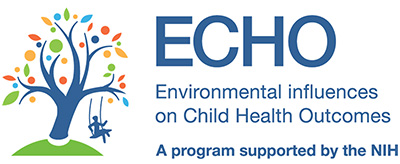Environmental influences on Child Health Outcomes (ECHO)
Mediators and Modifiers of Prenatal Environmental Exposures and Child Neurodevelopment (MEND)
The ECHO program is a national study funded by the National Institute of Health (NIH), whose mission is to improve the health of children for generations to come. The NIH ECHO program investigates how exposure to a range of environmental factors in early development – from conception through early childhood – influences the health of children and adolescents. The program focuses on five key pediatric outcomes that have a high public health impact: airway health, obesity, neurodevelopment, birth outcomes, and positive health.
The ECHO program plans to use the information we learn from families to investigate:
- How the environment may affect our children’s health.
- How genes and the environment interact to affect growth, development, and health.
- How conditions that appear later in childhood and adulthood begin in early childhood.
About PATHWAYS GAPPS
MEND is a part of this larger ECHO study and will help us learn more about whether chemicals during a woman’s pregnancy affects the health of her developing child. MEND builds on two prior phases of the study:
- Global Alliance to Prevent Prematurity and Stillbirth (GAPPS): The original GAPPS study was founded in 2007 at Seattle Children’s and seeks to improve birth outcomes worldwide by reducing the burden of premature birth and stillbirth. That study recruited pregnant women and collected biological samples of urine, blood and placenta during pregnancy.
- The PATHWAYS-GAPPS study: In Cycle 1 of the ECHO program, Dr. Sheela Sathyanarayana was a Principal Investigator for ECHO PATHWAYS, a center grant under the NIH ECHO initiative that included the PATHWAYS-GAPPS cohort. The PATHWAYS GAPPS cohort included children born in the original GAPPS study who were then enrolled in this phase of the study during early to middle childhood. Children in the PATHWAYS GAPPS cohort live in Seattle or Yakima, Washington. ECHO PATHWAYS aimed to understand how children’s health may be affected by conditions faced by their mothers during pregnancy – specifically, chemicals in the environment (including phthalates and air pollutants) and stressful conditions or experiences, such as poverty, hardship, or tragic events. We focused on two aspects of child health: lung function (including asthma and similar airway conditions) and neurodevelopment, which includes child behaviors, emotional, and social well-being. A major part of this project was to investigate how the placenta plays a role in the development of these conditions. Read more about ECHO PATHWAYS.
About ECHO MEND

In Cycle 2 of the ECHO program beginning in 2023, Dr. Sheela Sathyanarayana and Dr. Brent Collett are Principal Investigators for the third phase, the ECHO MEND study. MEND stands for Mediators and Modifiers of Prenatal Environmental Exposures and Child Neurodevelopment. Our study will continue the PATHWAYS-GAPPS cohort, a diverse sample of over 650 participants recruited from rural and urban communities in Washington state with rich prenatal and longitudinal data. Children in this study are now 6-12 years old.
We will be collecting data on child health and development, home and neighborhood environments, and genetic and environmental factors from biological samples like urine, blood, and saliva. Our study roadmap illustrates what we will be measuring during annual study visits over the next seven years. Standardized data collection across the entire ECHO program will ensure that all information can be combined and used by researchers. More information for study participants can be found on our Information for ECHO MEND Participants page.
Our research group investigates a number of research questions, with a focus on endocrine disrupting chemicals in pregnancy and their impacts on children’s neurodevelopment. The MEND study will examine several child neurobehavioral outcomes, including measures of global cognitive ability and self-regulation. We will focus on exposure to endocrine-disrupting chemicals (including phthalates and organophosphate flame retardants [OPFRs]) in relation to child neurobehavior, including aiming to understand how these chemicals may affect health through DNA methylation. Additionally, we are investigating the potential for maternal nutrition and parental cognitive stimulation to improve outcomes. Our long-term goals are to identify mechanisms of neurotoxic exposure and actionable targets for intervention that could attenuate the effects of those exposures.
Additional Studies
Several additional studies build on this work within the ECHO program:
- Melamine and Cyanuric Acid Exposure and Kidney Injury in Children
- Developing a Remote Assessment to Measure Cognitive Stimulation
- Identifying Patterns of Child Health Outcomes in a Large Multi-Cohort Study
What We’ve Learned
We are grateful to all our families for giving their time to the study. Our goal is for our study participants to know about and understand the science behind the study visits. We have a nice study booklet that summarizes the science, and we share study results through newsletters. In the future, we plan to share individual participant results for chemical exposures.
Additional information, including links to the newsletters and study booklet, can be found on our Information for ECHO MEND Participants page.
Monthly Updates and other information about the ECHO project can be found on https://echochildren.org/.
Information for Investigators
If you are interested in collaborating, please contact Marnie Hazlehurst.
